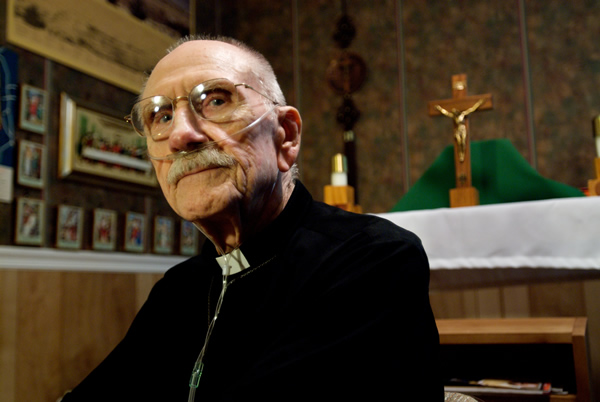
 There was a time when Father Duane Riplog was a regular father, with a wife and four children.
There was a time when Father Duane Riplog was a regular father, with a wife and four children.
He was a career military man who joined the Navy when he was only 17, just after the bombing of Pearl Harbor. Father Riplog said he felt a calling to God then, but was unsure of his qualifications.
So he joined the military and fought for his country in World War II and the Korean Conflict. He ticks off historical battles that most of us have only read about, but which he was part of: the battle of Normandy, where he served onboard the U.S.S. Hobson; trying to rescue survivors after his sister ship, the U.S.S. Corry, sank; the bombing of Okinawa, which he notes was on Easter Sunday; and so much more.
By the time the war ended, he said he was in bad shape and had lost his faith.
“We had all this killing, from the Holocaust on down. It was really hard to see a loving God then,” Father Riplog said.
He said his wife brought him back to the church, and slowly, God healed his wounds. From then on, every time the family moved somewhere new with the military, the first thing he did was register them at the closest Catholic parish.
His daughter, Cecilia Thrower, remembers being a devoutly religious family and said her mother always hoped one of her daughters would become a nun. His other daughters are Sarah Yonash, Mary Riplog and the late Nancy Magee.
Father Riplog retired from the Navy in 1972, and the family settled in Summerville and attended St. John the Beloved Church. When her mother passed away in 1979, Thrower said her father spent more and more time at the church. She said God filled the void left by her mother’s death.
Immersed in the faith, Father Riplog became a constant presence at St. John, and Msgr. Richard C. Madden and others at the church encouraged him to join the priesthood.
He was ordained in 1984 at age 60 by Bishop Ernest L. Unterkoefler, and his second life began. He said Pope John XXIII Seminary in Massachusetts was tough because studying was hard on an old man, but he had no trouble adjusting to the priesthood.
“It’s one of the great things in life where I felt I was of use,” Father Riplog said. “Jesus came here to serve, not to be served. It was such an honor to help people.”
For the next 15 years, he served parishioners across the Diocese of Charleston.
He was the parochial vicar at the Cathedral of St. John the Baptist in Charleston and St. Elizabeth Ann Seton in Mauldin. He served St. Mary Magdalene in Simpsonville when it was just a mission and Mass was celebrated in the Baptist church, he said.
Father Riplog was also pastor of Holy Spirit Church on Johns Island when Mass was still held in the original building, which was erected by the Knights of Columbus in the 1930s, he said. It only held 200 people, so he celebrated five Masses each weekend to accommodate church members from Johns, Kiawah, Seabrook and Wadmalaw islands.
He was assigned briefly to Our Lady of the Hills in Columbia before returning to St. John the Beloved, where he remained until he retired in 1999. Even then, the priest continued to celebrate Mass and help at the church until poor health forced him to stop.
Father Riplog was diagnosed with lung cancer in 2006. He underwent chemotherapy and radiation, but lost so much weight he could no longer function as a priest.
“I just said the heck with it. As old as I am, I’m not trying to see how long I can live,” he said.
The priest is matter-of-fact about his illness. He said having cancer does not bother him “one darn bit” and he embraces it as his personal cross to bear.
“I’d like to get on with it because I can’t really do anything I’d like to do as a priest,” Father Riplog said. “As soon as the Lord feels ready to take me; I don’t know what else to do besides do his will.”
He continues to celebrate Mass daily in front of a wooden altar built with his own hands in a chapel in his house. His daughter, Cecelia, lives next door and comes over every day to serve.
Occasionally, he visits the church where he places seminary brochures along the pews and encourages other men to consider late-life vocations.
“It’s hard to describe the joy of being a priest, knowing that you’re doing, or trying to do, the work of God,” Father Riplog said.

